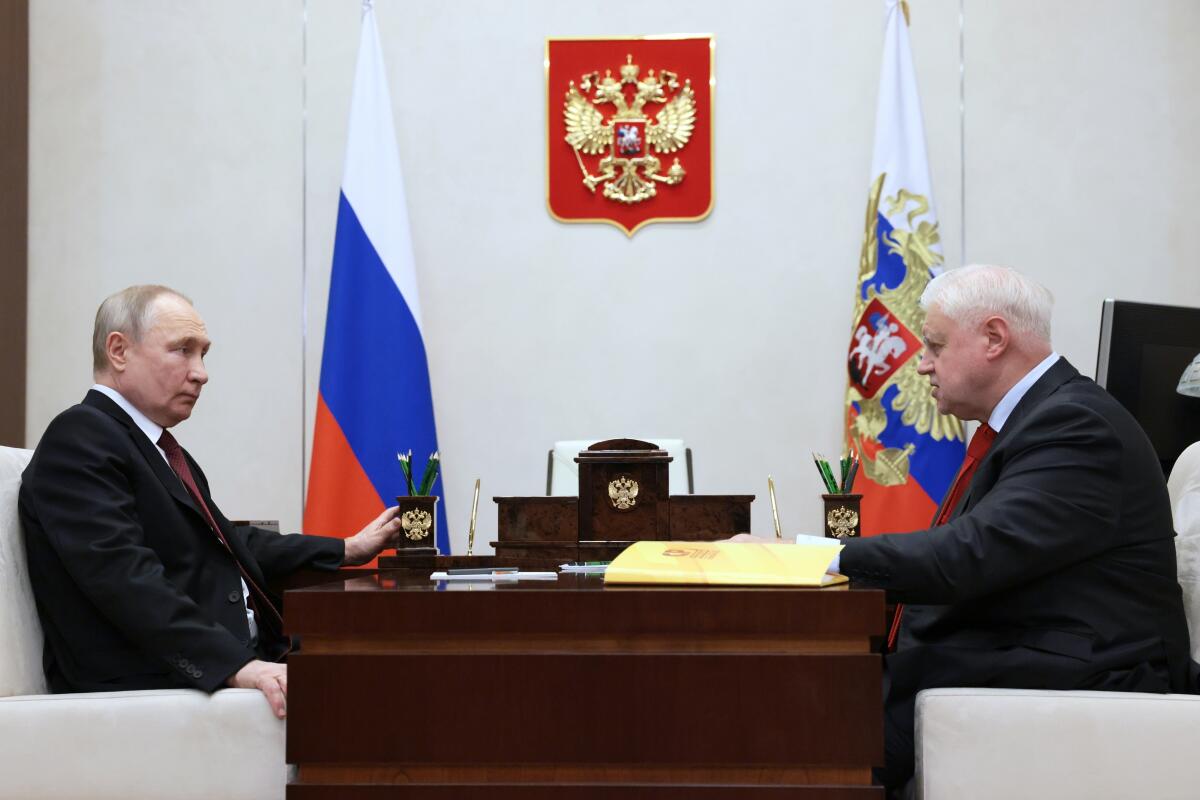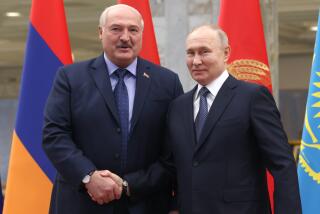Russian lawmaker disputes reports that he adopted a child taken from Ukraine

- Share via
LONDON — A Russian lawmaker and staunch supporter of President Vladimir Putin has denied media allegations that he adopted a missing 2-year-old girl who was removed from a Ukrainian children’s home and changed her name.
Sergey Mironov, 70, the leader of the political party A Just Russia, said on social media that Ukrainian security services and their Western partners had concocted a fake report to discredit Russian patriots like himself.
His statement, posted on X, followed Thursday’s publication by the BBC and Important Stories, an independent Russian news outlet, of an investigation that concluded he had adopted a child named Margarita Prokopenko, after she was allegedly taken to Moscow at the age of 10 months by the woman to whom he is now married.
Mironov accused the two news organizations of having only “one goal — to discredit those who take an uncompromising patriotic position.”
“You are trying in vain,” he wrote, adding that Russia would win its war in Ukraine.
The office of the Ukrainian parliament’s commissioner of human rights told the Associated Press it was looking into the news reports.
In March, the International Criminal Court issued arrest warrants for Putin and Maria Lvova-Belova, the commissioner for children’s rights in Putin’s office, accusing them of committing war crimes by being involved in the abduction of children from Ukraine.
Bill Van Esveld, associate director of the Children’s Rights Division at Human Rights Watch, said Friday that the agency could not independently confirm the findings by the BBC and Important Stories. But he said he thinks it would be “a black-and-white war crime” to deport the girl to Russia and enable her adoption and name change.
The investigation by the BBC and Important Stories said Margarita was taken in August 2022 from a home for children needing specialized medical care or whose parents were missing. The home is in the southern Ukrainian city of Kherson, which was occupied by Russian forces at the time.
The news organizations identified Inna Varlamova, 55, as a woman who had visited the baby in Kherson before a group of Russian men removed the child from the home. Varlamova later married Mironov.
The investigation also cited a birth record created several months later that listed the couple as the parents of a child named Marina who was born on Oct. 31, 2021 — Margarita’s birthday.
Ukrainian officials estimate that about 20,000 children have been sent out of the country without their parents’ knowledge or under false pretenses since Russia invaded in February 2022.
A study by Yale University found more than 2,400 Ukrainian children ages 6 to 17 had been taken to Belarus from four regions of Ukraine that are partially occupied by Russian forces.
The AP reported in October 2022 that Russian officials had sent Ukrainian children to Russia or Russian-held territories without consent, told them they were not wanted by their parents, and gave them Russian families and citizenship.
Vira Yastrebova, director of the Eastern Human Rights Group, a Ukrainian nongovernmental organization, said Russian authorities were increasingly placing children into Russian foster families for eventual adoption instead of temporary guardianship.
Because Russian law makes it very difficult to find information about adoptions, it is easy “to hide any information” about the children, Yastrebova said.
Russia’s ambassador to the United States, Anatoly Antonov, maintained in September that Russia does not “kidnap” Ukrainian children but is “saving” them. Russia has said it will return children to their families at the request of a parent or guardian. But many Ukrainian families don’t know where their children were taken, so they are unable to request their return.
Even when children are located, reuniting them with their families during the ongoing war often is a complicated process, involving a lot of paperwork and international border crossings.
Pope Francis tasked his Ukraine peace envoy earlier this year with trying to get young Ukrainians returned to their country.
The transfer of Ukrainian children to Russia will affect them profoundly and have “a lifelong impact,” Human Rights Watch’s Van Esveld told the AP in a phone interview on Friday, explaining:
“They have no opportunity to go back to their community or country, and their development, right to education and right to form their own identity without coercion is impacted.”
Associated Press writer Yuras Karmanau in Tallinn, Estonia, contributed to this report.
More to Read
Sign up for Essential California
The most important California stories and recommendations in your inbox every morning.
You may occasionally receive promotional content from the Los Angeles Times.













